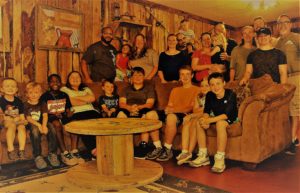Biblical Community – One Another
Imagine a typical Sunday morning scene… friends are walking into church hugging folks they haven’t seen (or thought of) all week. Kiddos are grabbing each others’ hands and running down the hall to go to Sunday School (freedom!). Adults stand in line to get a cup of coffee at the new church coffee shop to support the teens’ summer mission trip, but the coffee is really cheap and, honestly, awful, but the coffee aficionado won’t embarrass her husband again by bringing in a Starbucks cup (oh my, that was a hostile Sunday dinner at the mother-in-law’s a few weeks ago!). The elderly members are shuffling, flustered and late because their bodies just won’t move like they used to (but they are too ashamed and uncomfortable to ask someone to give them a ride) and they are trying to figure out who is sitting in their pew this week. The list could go on. Maybe it is the new mom who feels judged because she cannot nurse her little one and the mamas who head to the nursing mother’s room passed disapproving glances when she came in once and bottlefed her little one. Maybe it is the dad of a teen who almost came to blows with the almost-man who, as a newborn baby, was the miracle that made him straighten up, get a job, and stop drinking.
Is that church? Is that a picture of biblical community above? That illustration is all too real too often. So, what is biblical community, exactly, and, are you/we doing biblical community well? If you have questions or comments about biblical community that you would like to ask, please email or comment below. We would love to hear about your experiences.
To the church of God at Corinth, to those sanctified in Christ Jesus, called as saints, with all those in every place who call on the name of Jesus Christ our Lord—both their Lord and ours. 1 Corinthians 1:2
What a powerful introduction to a letter to the church of God at Corinth, but also, a very powerful message to all believers. That opening is not just for the Corinthians. We could technically write in ‘to the church of God at ______ (your city/town/etc).” The church* has both local and universal aspects. Locally, we are a body of believers who are to live for Christ – together – as we shine His light in a dark world. The church universal has similar callings with the knowledge that we are connected to fellow believers beyond what our eyes can see. That’s a quick and simple first look at what biblical community is supposed to be. Yet, why are so many folks struggling like the ones in our Sunday morning illustration? Let’s look deeper into 1 Cor 1:2 to discovery God’s plan for biblical community.
Sanctified in Christ Jesus. God’s community is designed to be different. We are not a social club or group that is to be focused on ourselves. In our world and fleshly desires, we often slip into a routine or habit when we are in church or with our church friends; these worldly desires are not the definition or purpose of the church. Now, don’t take as our saying the church should not have some social aspects, but we are set apart for much more. We are sanctified — declared holy and set apart for God’s glory. And, sanctification is a process wherein we are shaped and transformed into the image of Christ. That takes time, work, and empowerment by the Holy Spirit. Authentic biblical community plays a huge part of that plan. “Speaking the truth in love, “iron sharpens iron,” and biblical guidelines to address wrongs are not just platitudes; they are part of authentic biblical community that brings us closer to God and to each other (remember our triangle analogy last month?).
Called as saints. What do you think when you hear the word ‘saints?’ Personally, religious images come to my mind — people designated by religion** as different, special, or even better than the majority. Unfortunately, the word saint has been hijacked by religion to the detriment of the concept. As discussed above, it follows being set apart. AND, notice that it follows the statement about God’s church; this is not an individualist concept. The very word itself is plural – saints. We are to part of a collaborative effort — a community of believers in Christ Jesus. We are not Lone Ranger Christians.
In every place who call on the name of Jesus Christ our Lord. The church and, thus, biblical community were never meant to be in only one place but to extend to the ends of the earth — all together calling on the name of Jesus. A community expanded, together. A community beyond measure, together. A community of purpose, together.
Both their Lord and ours. Jesus, our Lord. Jesus, our identity. We were created in community to be community in Christ. We desire identity bigger than ourselves, and we can see that in our culture as people purchase products simply because of the identity associated with a brand or idea. Do we make those attempts of identity bigger than our true identity in Christ? Biblical community is created to encourage each Christ follower to stay the course as we journey through this life focused on the Lord.
So, how do we then do biblical community? One way is displayed in the multitude of “one another” statements in the Bible. To define what “one another” means, we would say that it is a command for ministry within authentic biblical community, or, in other words, the things we should be doing for one another. If you do a simple search on “one another” in the Bible, you will find more than 200 verses*** that contain those two words, depending on your translation. Much like a web-based search, some results don’t necessarily put the two words right next to each other, but each of those times, it is set in the context of community. The two-word English-translated “one another” concept we are talking about is based on a Greek single word ‘allelon,’ which is found 100 times in the the New Testament. There is a nice infographic found here. Several verses talk about the unity of the church, others talk about how to love one another, and others talk about how to put others before ourselves in service.
Let’s look at an example… Even when someone has wronged you, continued in sin, and may have received church discipline (See to it that no one repays evil for evil to anyone, but always pursue what is good for one another and for all. 1 Thessalonians 5:15), God also tells us in 2 Corinthians “so that on the contrary you should rather forgive and comfort him, otherwise such a one might be overwhelmed by excessive sorrow” and in Galatians 6:1 “Brothers and sisters, if someone is caught in a sin, you who live by the Spirit should restore that person gently. But watch yourselves, or you also may be tempted.” Authentic biblical community is one anothering; we help each other right wrongs — forgiving each other when needed and growing stronger together.
Here’s another example… You see the elderly widower struggling every week; you are struggling, too. You have three kids and a chaotic schedule, and the screaming (sometimes by you and your spouse) on the ride to and from church would just be too embarrassing. Yet, he is only one street over, so you guiltily offer him a ride on Sundays. It calms the screaming a bit, but even when the kids (and you) are in rare form, the gentle chuckle and reassuring pat, help put everything into better perspective. He is paying a younger neighbor boy to mow and weedeat, but the teenager is accidentally destroying the beautiful landscaping that the widower and his wife worked so hard on the last 40 years. You take the time to go over a couple of times when you see him out, giving kind and gentle pointers, just as you have received on your Sunday morning rides. You find out that this teenager’s dad took off when he was 2, and his mom is trying, but he really doesn’t know how to become a man well. He agrees to join the widower and your family on those Sunday morning rides. The screaming is a bit much for him sometimes, but he still comes. Then, two years later, you have the chance to help the old man baptize the young man just a few short weeks before your now-mentor draws his last breath, surrounded by family—your family and his.
Authentic biblical community is opening your heart and your home, being transparent and honest, loving the Lord more than your pride and gaining so much in return during the joy of one another moments.
*The church is not a building; the church is God’s people.
**The word religion here is used distinctly from the simple meaning of “the belief in and worship of a superhuman controlling power, especially a personal God or gods.” We are referring to the organized institutions that …. What is the difference between religion and relationship?
***In the ESV there are 251 results, CSB 217, NASB 261, KJV 238… so we could easily say that well over 200 times the Bible talks about “one another.”





Sorry, comments are closed for this post.